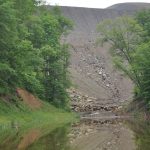
The Clearfork Valley of Tennessee has been intensely surface-mined going back decades. Now, Kopper Glo Mining is moving forward with a nearly 1,500-acre mountaintop removal mine on nearby Cooper Ridge.

The Clearfork Valley of Tennessee has been intensely surface-mined going back decades. Now, Kopper Glo Mining is moving forward with a nearly 1,500-acre mountaintop removal mine on nearby Cooper Ridge.

Diagnoses of the most severe form of black lung disease, known as progressive massive fibrosis, are on the rise in Appalachia. The causes of this deadly trend aren’t entirely clear, though it may be linked to the silica rock dust associated with thinner layers of coal.

Extracting coal and natural gas is linked to a range of health problems in Appalachia, including shorter life expectancies.

Changes in federal health policy could leave even more residents without adequate access to healthcare — and increase the number of patients who rely on nonprofit safety net clinics. In Southwest Virginia, the grassroots group We Care aims to create more dialogue between the public and legislators about the healthcare system.

The U.S. Department of the Interior ordered the National Academy of Sciences to halt its review of the links between mountaintop removal coal mining and human health impacts.

In his final year in office, Governor McAuliffe can cement a powerful legacy on climate and the economy by leading the way on environmental protection and climate action.

Guest bloggers Divest Appalachian members Cassidy Quillen and Olivia Nelson take a look at how the Atlantic Coast Pipeline touts an ideology of sustainability while profiting off of industries driving climate change.

The White House released its budget blueprint last week, and the proposal is nothing short of a disaster for Appalachia and rural communities across the country. Here’s a look at a few agencies and programs the White House wants to completely eliminate if it had its way.

For all my life, the coal economy has ruled this region and its people,” writes Ron Short of Danville, Va., in a letter supporting the Stream Protection Rule. “Now we are facing the demise of the coal industry, and we must save the valuable natural resources that we have left if we are ever to develop cultural tourism and eco-tourism as important parts of a new economy that works for everyone.”

When Congress voted last week to overturn the Stream Protection Rule, people braced themselves for the coming impacts. But threats to public water from corporate and political interests are nothing new in Central Appalachia, nor is the problem unique to this area. In the face of these threats, communities fighting for clean water need our continued support.